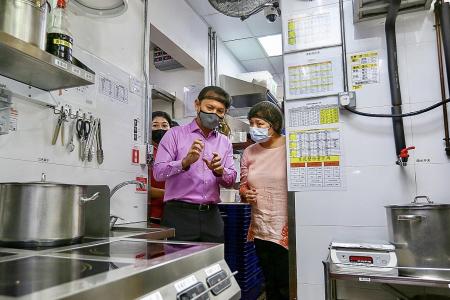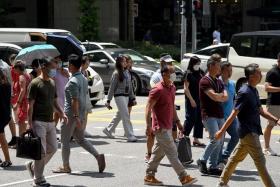Government studying progressive wages for food service sector
But raising pay for low-salary workers in sector could lead to higher costs for consumers: Zaqy
Consumers may have to pay more when eating out so that low-wage workers, including cooks, waiters and kitchen assistants, can see higher wages.
This could be the impact of a move to raise the income of low-wage workers in the food services sector, said Senior Minister of State for Manpower Zaqy Mohamad yesterday.
He was speaking to the media after a visit to Jumbo Seafood restaurant in Upper Circular Road, a trip he made to better understand the obstacles in uplifting low-wage workers in the food services sector.
Mr Zaqy said the Tripartite Workgroup on Lower-Wage Workers, which he chairs, is exploring ways to improve the well-being of such workers.
One approach is to extend the progressive wage model (PWM) to the food services sector, where wages rise along with skills training and improvements in productivity.
But higher wages may result in rising costs that could trickle down to consumers, said Mr Zaqy. "There will always be that element that we may have to review cost structures, prices, and how this would impact consumers," he noted.
"If we do too much, the impact on consumers would be significant, but if we do too little, it may invite criticisms that our efforts to help lower-wage workers do not work well. We need to calibrate our efforts."
About 60 per cent of the sector's resident full-time workers currently receive salaries at or below the bottom 20th wage percentile of the local workforce.
DIVERSE
In studying wage progression, the group is exploring if this can work across the diverse sector, which has everything from fine-dining restaurants and fast-food joints to coffee shops and caterers.
Mr Zaqy said the group also needs to consider that firms may be at different stages of recovery from the pandemic and have concerns about business costs.
"There are different segments we need to look at, and be careful in how we implement a PWM if we decide to do so."
The PWM sets out minimum salaries for local workers in various roles along a career and skills progression framework. It also outlines the career progression pathway for workers in a sector.
Since it was formed in October last year, the tripartite group has been studying various sectors that could potentially implement progressive wage models within them.
The group comprises industry leaders from the Singapore National Employers Federation, union leaders and senior civil servants.
It aims to provide an interim update by the middle of this year and complete its work by the first quarter of next year.
Get The New Paper on your phone with the free TNP app. Download from the Apple App Store or Google Play Store now



